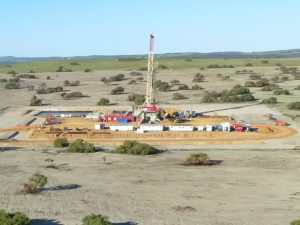16 November 2016
Shareholders of AWE Ltd and Senex Energy Ltd gathered for their Annual General Meetings today, in Sydney and Brisbane respectively.
While it’s a coincidence that their AGMs were held on the same day, there are a number of similarities between the two companies. Both are mid-cap upstream oil and gas companies, both are avid proponents of the nonsensical gas as a “transition fuel” concept, both talk of long-term growth and development, and neither discuss 2C scenario global warming planning, or the impact of expected changes in energy policies stemming from the Paris Climate Agreement.
Oil and gas companies like AWE and Senex present a difficult dilemma for investors attuned to efforts to address climate change. The latest research on the carbon budget suggests that if the world were to burn all reserves in existing coal, oil and gas fields, the carbon emitted would see us exceed 2C of warming. This suggests that if we are to limit warming to 2C, then we cannot develop any new fields, and exploration becomes redundant. This thinking is, of course, quite offensive to oil and gas companies like AWE and Senex that against all available evidence continue to argue that they are part of the transition to a low-carbon economy.
Both companies’ recent share price performance has reflected the heavy decline in oil prices since mid-2014. Both companies have cut costs dramatically, including capital expenditure and executive bonuses, in an effort to survive in what BP describes as a “lower for longer” oil price environment. Yet, as we identified in our report ‘Digging Deeper’, AWE and Senex continue to reward executives for meeting exploration targets. As so much of these companies’ value is tied up in their reserves, both proven and contingent, asking them to stop exploring fundamentally changes their business model – which is exactly what they need to do.
Both AWE and Senex have previously or are currently drilling for unconventional gas. According to the Melbourne Energy Institute, if fugitive methane emissions from Australia’s unconventional gas fields exceed 3.2% of production, there would be “no carbon benefit gained by using gas for electricity generation”. Yet, conveniently, neither AWE nor Senex are actively measuring fugitive emissions. AWE have commissioned the CSIRO to gather baseline data including water quality in the Perth Basin, but alarmingly, fugitive emissions are not within the scope. The lack of baseline data in the Queensland coal seam gas fields has allowed the likes of Origin Energy and Santos to claim that fugitive emissions were naturally occurring.
 AWE’s auditors – Ernst & Young – were asked if they had considered climate risk – both physical and transition risks – in their audit of the financial accounts. They responded by saying climate was included in their “overall risk management program”, but they did not consider it a material business risk. This is quite a staggering response, given that AWE have written down the value of their reserves by more than $600 million in the last two years. The energy sector is undergoing severe disruption, so it seems only logical that the risk posed to AWE’s future profitability must be material.
AWE’s auditors – Ernst & Young – were asked if they had considered climate risk – both physical and transition risks – in their audit of the financial accounts. They responded by saying climate was included in their “overall risk management program”, but they did not consider it a material business risk. This is quite a staggering response, given that AWE have written down the value of their reserves by more than $600 million in the last two years. The energy sector is undergoing severe disruption, so it seems only logical that the risk posed to AWE’s future profitability must be material.
When asked about exploration targets in their remuneration packages, both AWE and Senex provided very similar answers. That short term incentives hadn’t been paid in the prior year, and that exploration expenditure was unlikely to be significant in the coming year, due to low oil prices. The boards of these companies still don’t see a problem in business as usual, and it seems as though large shareholders haven’t challenged them on this either – they overwhelmingly approved both remuneration reports which encourage continued exploration.
There is little evidence to suggest that AWE and Senex are taking climate change seriously. Neither company provide any serious discussion or analysis of long-term energy demand, or impacts from climate policy changes. Both companies see only opportunity in changing climate policies, which simply ignores the urgency required to cut emissions. Gas as a transition fuel may have made sense twenty years ago, but there now exists commercially viable zero-emission energy alternatives, which pose a genuine risk to companies like AWE and Senex.

